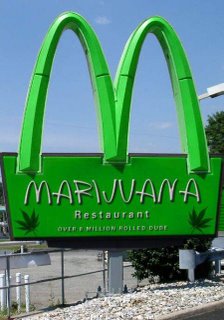Social Justice, Liberty
Philosophers on Drugs

Ron Paul’s recent public statements endorsing the legalization of heroin have caught him some flak, and not just from political conservatives. Meanwhile, in university-land, I’ve just wrapped up another semester where we’ve spent some time surveying philosophers’ contributions to the drug legalization debate.
The difference is striking.
In politics, today, you can almost get away with saying that marijuana ought to be legal and still have a shot at national office. Not, of course, without a large number of people claiming that your endorsement of legalization could only be driven by your clandestine desire to smoke as much dope as you can.
Among philosophers, in contrast, it is difficult to find anyone who is willing to argue for the moral defensibility of the status quo. Nobody I’ve read thinks it is morally proper for the state to lock people up in jail for the mere use or possession of marijuana, or of heroin, cocaine, or methamphetamines either as far as I can tell.
For example, the book I’ve been using in my classes is The Legalization of Drugs: For and Against, a 2005 book from Cambridge containing two long essays from Doug Husak and Peter de Marneffe. The title of the book suggests a clear line of division between the authors, but the most impressive thing about the debate is just how much common ground there is between the allegedly opposing sides.
Husak’s essay, in line with much of his other work on the topic, is pretty squarely on the pro-legalization side. But to describe DeMarneffe’s position as “against legalization” is a bit misleading. What DeMarneffe actually advocates is “decriminalization,” which means that although the large-scale manufacture and sale of certain drugs will still be criminal offenses, the possession and use of them will not. And to the extent that DeMarnfeffe argues against full legalization, his claims are mostly directed against the legalization of heroin. Nothing in his piece gives me any reason to think he’d oppose the full legalization of marijuana.
For DeMarneffe, the case against full legalization is based on a kind of paternalism, of the same sort he has recently deployed in an extended argument against the full legalization of prostitution. Heroin use is bad for people, especially young people, and the state is justified in taking measures to reduce that harm. At the same time, the state has an obligation not to interfere too excessively with personal autonomy. People have a legitimate autonomy interest in using or experimenting with certain drugs, so locking them up for doing so would be morally illegitimate. But DeMarneffe does not think that any similar autonomy interest is violated in locking up people for manufacturing or selling drugs. His thought seems to be that what you do for work is not as intimately connected with your plan of life as what you put in your body. If the job of heroin manufacturer is legally off the table, you can just do something else for a living instead. More details about his argument can be found in a good, ungated review of the book here.
DeMarneffe’s is the most philosophically sophisticated and well-informed anti-legalization argument I’ve seen in the philosophical literature. And even it endorses a policy regime that is radically different from the one we have. This, I think, is telling.
Of course, I don’t think DeMarneffe goes nearly far enough. I’m puzzled by the claim that what we do for work some 40 hours a week is less an issue of personal autonomy than what we smoke or shoot up on the evenings or weekends. But even supposing we grant that, doesn’t decriminalization (as opposed to legalization) place a pretty big constraint on the autonomy of people who want to use drugs? Sure, DeMarneffe doesn’t want to criminalize drug use outright, but doesn’t making it illegal to make or sell them make it very, very difficult for users to acquire and experiment with them? As an analogy, suppose we didn’t make it illegal for you to get married, but we did make it illegal for anyone else to marry you. Wouldn’t this be a pretty serious infringement of your autonomy?
Moreover, DeMarneffe’s policy regime misses out on one of the greatest advantages of full legalization: the reduction in criminal violence, police militarization, massive expense, and infringement of civil liberties that would be had by ending the war on drugs. Increasing the autonomy of potential drug users is a good thing, if DeMarneffe’s policy can indeed be said to do that. But making it harder for these guys to stay in business seems at least as important, if not more.

